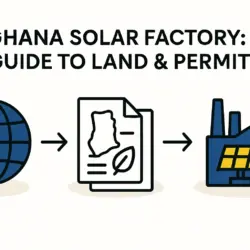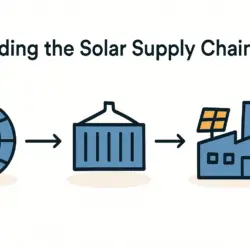Ghana has taken a significant step towards renewable energy with the commissioning of a 50 MW solar plant in the Yendi Municipality of the Northern Region. Developed by Bui Power Authority (BPA) in partnership with First Sky Limited, the project underscores the government’s commitment to expanding the country’s renewable energy infrastructure and reducing its dependence on fossil fuels. This initiative is part of a broader plan to develop 500 MW of solar capacity nationwide, aligning with Ghana’s target to source 10% of its national energy mix from renewable sources by 2030.
Details of the Ghana Solar Plant
Expected to generate approximately 100 gigawatt hours (GWh) of electricity annually, the new 50 megawatt power plant will be crucial in meeting the energy needs of the Yendi Municipality and surrounding areas. BPA has already signed a Power Purchase Agreement (PPA) with the Electricity Company of Ghana (ECG) to distribute this clean energy to consumers.
Spanning 140 acres, the facility is the first wholly-owned Ghanaian renewable energy initiative and the country’s second-largest solar project, following the 55MW Solar PV Project at Bui. Notably, all experts involved in its development are Ghanaian, marking a milestone for indigenous participation in the renewable energy sector.
The solar project, developed under a $59 million Engineering, Procurement, Construction, and Financing (EPC+F) agreement, aligns with the government’s broader strategy to diversify Ghana’s energy mix. This diversification is particularly significant given the country’s reliance on hydroelectric and thermal power, which are vulnerable to fluctuations in rainfall and global energy markets.
At the commissioning ceremony, BPA’s Chief Executive Officer, Samuel Kofi Dzamesi, highlighted the importance of the Yendi solar plant. He noted that the project is part of BPA’s mandate to increase the share of renewable energy in Ghana’s national mix. Dzamesi emphasized that the plant would not only enhance energy security but also contribute to environmental sustainability by reducing carbon emissions.
Community Impact and Future Expansion
The Yendi solar project has been well received by the local community, which actively participated in the planning and implementation phases. BPA engaged local stakeholders through consultations and awareness campaigns to ensure the project meets community needs while minimizing potential negative impacts.
To address any disruptions caused by the project, BPA also launched a comprehensive compensation and resettlement program. This program provided financial compensation to affected households and facilitated the relocation of those displaced by the plant’s construction.
Looking ahead, BPA plans to expand the Yendi solar project by another 50 MW, bringing its total capacity to 100 MW. This expansion is part of the authority’s broader goal to increase Ghana’s renewable energy capacity to 500 MW by 2025. BPA is also conducting feasibility studies for solar projects in other regions, including Sissala East in the Upper West Region and Buipe and Tuna in the Savannah Region. For more information on Ghana’s solar energy market, you can visit PVKnowhow.
Ghana’s Renewable Energy Goals
The Yendi solar project is a key example of Ghana’s growing commitment to renewable energy. In recent years, the government has implemented several policies to promote the development of clean energy sources. The Renewable Energy Act of 2011, for instance, provides a legal framework for the promotion, development, and utilization of renewable energy in Ghana.
Beyond solar power, Ghana is exploring other renewable energy sources like wind, biomass, and small-scale hydroelectric projects. The government has set an ambitious target to achieve 10% renewable energy in the national energy mix by 2030. This move would significantly reduce the country’s greenhouse gas emissions and contribute to global efforts to combat climate change.
The Yendi solar project is a major milestone in Ghana’s renewable energy journey. By investing in clean energy, the country is not only addressing its own energy needs but also contributing to the global fight against climate change. As more Ghana solar energy projects come online, the nation is poised to become a leader in sustainable energy development in Africa.



